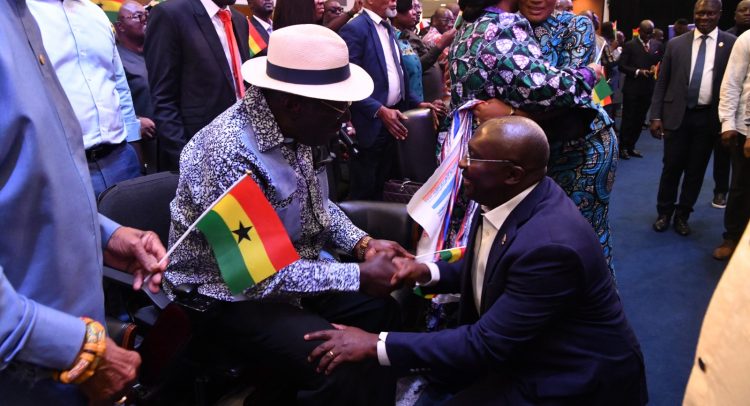
By E. Kingsley LARBI (Rev. Prof.)
In the annals of personal and professional development, stories of perseverance, resilience, and vision often stand out as guiding lights for those seeking to carve their paths in life. Born to Win, a remarkable book by Rev. Prof. E.K. Larbi, is one such beacon. The book provides readers with profound insights into overcoming challenges and achieving success against the odds. Chapter 11, titled “A Vision for the Future,” is particularly compelling, as it encapsulates the essence of what it means to pursue one’s dreams with unwavering determination and faith.
This chapter takes readers on a journey from the rural village of Adimadim to the bustling city of Accra, the administrative capital of Ghana. Through the eyes of the author, we witness the transformative power of vision, education, and hard work. The narrative not only tells a story of personal growth but also offers valuable lessons for anyone seeking to realize their potential. In this feature article, we delve into the key themes of Chapter 11, exploring the significance of having a vision for the future, the importance of education, the role of perseverance, and the value of gratitude and good deeds.
A journey of vision and determination
The chapter begins with a poignant; Twi proverb that sets the tone for the entire narrative: “When you are sitting at the same place, you are sitting on your destiny.” This proverb serves as a powerful reminder that idleness is the enemy of progress. For the author, Rev. Prof. E.K. Larbi, this realization came early in life. After completing elementary school in 1969, he and a few friends from his village decided to explore Accra. This exploratory trip sparked a fire within him—a burning desire to return to the city, further his education, and secure a job that would enable him to support his family.
This initial visit to Accra left a lasting impression on the author. The contrast between the rustic landscape of Nsawam and the vibrant cityscape of Accra fueled his determination to return to the city as soon as possible. His vision was clear: he needed more education and a job to finance that education and improve the living conditions of his family. This vision became the driving force behind his journey to Accra, marking the beginning of a life-changing adventure.
The role of education and work in shaping the future
Upon returning to Accra in early 1970, the author set out to achieve his goals. With the help of his uncle, Mr. Emmanuel Adi Yirenkyi, who worked as a Postmaster at the Posts & Telecommunications Department, the author secured a job as a messenger at the State House Post Office. This job not only provided him with the financial means to pursue his education but also exposed him to a world of possibilities. Working at the Post Office, which was located in the same building that now serves as Ghana’s Parliament House, allowed him to interact with international and local dignitaries. These experiences broadened his horizons and further fueled his ambition.
The author’s decision to enroll in evening classes, despite his uncle’s initial reservations, underscores the importance of education in realizing one’s potential. His relentless pursuit of knowledge, even while working, highlights a key lesson for readers: education is a powerful tool for self-improvement and social mobility. The author’s story serves as a testament to the fact that with determination and hard work, one can overcome any obstacle and achieve success.
Perseverance in the face of challenges
Chapter 11 also delves into the challenges the author faced during his early years in Accra. Living with his uncle’s family, the author encountered both hospitality and tension. The crowded living conditions and the eventual fallout with his uncle over a misunderstanding highlight the difficulties that often accompany the pursuit of one’s dreams. However, instead of giving up, the author chose to persevere. He relocated to Labadi, a suburb of Accra, where he continued to work and build his future.
This aspect of the chapter emphasizes the importance of resilience in the face of adversity. The author’s ability to navigate challenges and maintain his focus on his goals serves as an inspiring example for readers. It teaches us that setbacks are inevitable, but how we respond to them determines our ultimate success.
The value of gratitude and good deeds
One of the most profound lessons in Chapter 11 is the importance of gratitude and doing good to others. Despite the fallout with his uncle, the author never forgot the kindness he received upon his arrival in Accra. He later provided support to his uncle during his final years and even played a significant role in his interment. This act of kindness underscores a crucial message: good deeds are inherently valuable, and they often come full circle.
The author also reflects on the biblical principle of doing good without expecting anything in return. He reminds readers that helping others, even those who may seem undeserving, is a divine act. The chapter reinforces the idea that generosity and gratitude are essential virtues that can enrich both the giver and the receiver.
Conclusion
Chapter 11 of Born to Win by Rev. Prof. E.K. Larbi is a powerful narrative that encapsulates the essence of vision, perseverance, education, and gratitude. Through his journey from a rural village to the city of Accra, the author demonstrates that with a clear vision and unwavering determination, one can overcome any obstacle and achieve great success. The lessons drawn from this chapter are timeless and universally applicable. They remind us that the pursuit of knowledge, the resilience to face challenges, and the generosity to help others are the cornerstones of a fulfilling and successful life.
As readers, we are encouraged to cultivate these virtues in our own lives. Whether we are at the beginning of our journey or well on our way, the insights from Chapter 11 provide invaluable guidance on how to navigate the complexities of life and emerge victorious. Ultimately, the message is clear: we are all Born to Win, but it is our vision for the future and our actions in the present that will determine the extent of our success.
The post From dreams to destiny: Unleashing the power of vision appeared first on The Business & Financial Times.
Read Full Story












Facebook
Twitter
Pinterest
Instagram
Google+
YouTube
LinkedIn
RSS